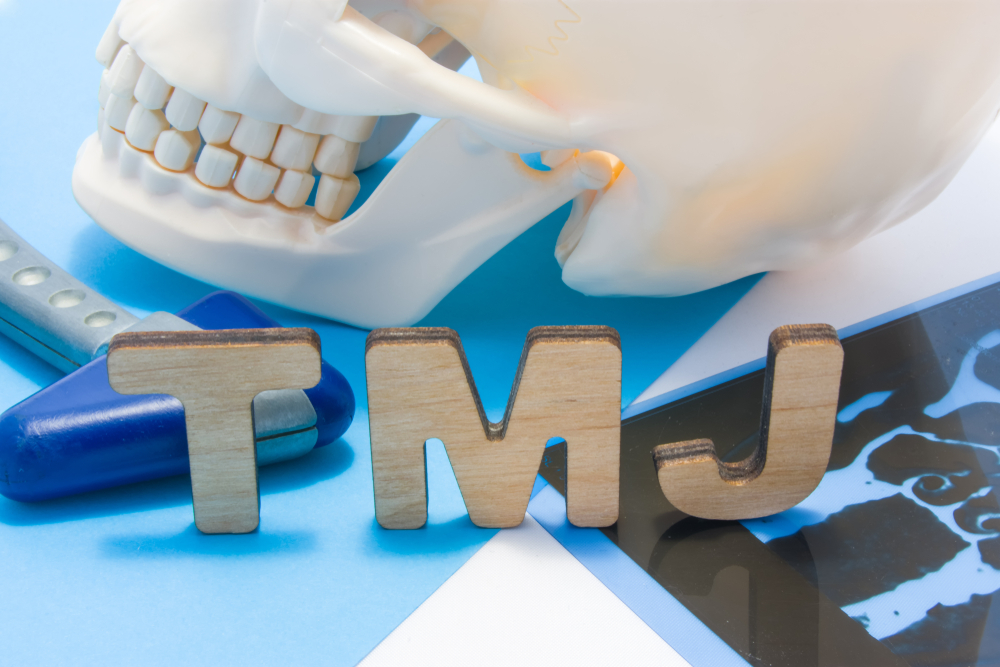Understanding TMJ and Solutions to Help Conquer It!

November is recognized as TMJ awareness month, shedding light on a condition known as Temporomandibular Joint Disorder (TMJ). This disorder impacts a significant number of individuals, affecting their daily lives in a myriad of ways. In this blog, we will delve into the intricacies of TMJ, its signs and symptoms, and present various treatment solutions—including the innovative Botox Therapeutics in dentistry.
What is TMJ?
The temporomandibular joint is the connection of the jawbone to the skull, facilitating essential functions like talking and eating. TMJ arises from problems with the joint or surrounding muscles due to stress, jaw misalignment, or arthritis. The prevalence of TMJ (Temporomandibular Joint Disorders) can vary, but it’s estimated that TMJ disorders may affect a large portion of the population at some point in their lives. Exact figures regarding how many Canadians are affected by TMJ might not be readily available as the severity and symptoms can vary significantly among individuals, and not everyone seeks medical attention for their symptoms.
Signs and Symptoms of TMJ
Typical signs of TMJ include jaw pain, headaches, and a clicking sound when the jaw moves. Early diagnosis and treatment are pivotal to managing the condition effectively. Numerous real-life anecdotes underline the distress and discomfort experienced by individuals suffering from TMJ.
Diagnosis and Evaluation
TMJ diagnosis entails a comprehensive evaluation by healthcare professionals. They review dental and medical history and may employ diagnostic tools like X-rays or MRI scans to ascertain the condition’s extent.
Conservative Treatments
Conservative treatments offer a non-invasive approach to managing TMJ. They encompass lifestyle modifications, stress management, and physical therapy, which have proven effective in alleviating TMJ symptoms, thereby enhancing individuals’ quality of life.
Botox Therapeutics in Dentistry
Botox Therapeutics, a relatively new venture in the realm of Dentistry in Waterloo, shows promise in treating TMJ. Botox alleviates muscle tension and pain by inhibiting neurotransmitter release, thus reducing muscle contractions. Its minimally invasive nature and swift results make Botox Therapeutics a compelling option for those battling TMJ.
Botox Therapeutics Treatment Procedure:
The Botox Therapeutics treatment procedure is straightforward. It entails injecting Botox into specific muscles surrounding the temporomandibular joint. Patients can anticipate minimal discomfort during the procedure and a quick recovery. Although rare, potential side effects may include bruising or facial stiffness.
Other Treatment Options
Aside from Botox Therapeutics, other treatment avenues include dental appliances, medications, or, in severe cases, surgical interventions. Each has its set of pros and cons and may be considered based on the individual’s unique condition and consultation with healthcare providers.
Self-Care and Lifestyle Tips
Managing TMJ symptoms at home is feasible through dietary modifications, relaxation techniques, and exercises. Maintaining impeccable oral hygiene is also crucial in promoting overall oral health, which can, in turn, alleviate TMJ symptoms.
Seeking Professional Help
Consulting a qualified healthcare provider or a specialized dentist in Waterloo for a precise diagnosis and personalized treatment plan is imperative. Ongoing follow-up care and monitoring are equally essential to ensure the treatment’s effectiveness and manage any recurring symptoms.
Seeking professional help and continuing treatment for Temporomandibular Joint Disorders (TMJ) is crucial for several reasons:
Accurate Diagnosis:
TMJ disorders can present a complex set of symptoms that might be confused with other conditions, such as sinus issues, tooth decay, arthritis, or even migraines. A healthcare professional or a dentist specializing in TMJ can provide an accurate diagnosis through a thorough examination and the use of specialized diagnostic tools.
Individualized Treatment Plan:
Each case of TMJ may vary in terms of cause and severity. Professionals can create an individualized treatment plan that addresses each patient’s specific issues, which can range from physical therapy and dental appliances to medications or even surgery in severe cases.
Preventing Worsening Conditions:
Without proper treatment, TMJ disorders can worsen over time, leading to more severe jaw pain, headaches, ear pain, and difficulty in moving the jaw. Early intervention and continuous treatment can help in preventing the escalation of these symptoms.
Improving Quality of Life:
TMJ disorders can significantly impair an individual’s quality of life. By seeking professional help, individuals can alleviate painful symptoms, improve jaw functionality, and subsequently enhance their overall well-being.
Monitoring and Adjustment:
TMJ disorders might require a long-term management plan. By continuing treatment and having regular check-ups, healthcare professionals can monitor the progress and make necessary adjustments to the treatment plan to ensure its effectiveness.
Education and Self-management:
Professionals can educate patients on self-management strategies, including exercises, stress management techniques, and dietary adjustments that can help in managing symptoms and preventing further complications.
Addressing Associated Conditions:
TMJ disorders may be associated with other conditions such as sleep apnea, bruxism (teeth grinding), or orthodontic issues. A professional can provide comprehensive care by addressing TMJ alongside these associated conditions.
Reducing Long-term Healthcare Costs:
Early and ongoing treatment can potentially reduce long-term healthcare costs by preventing the need for more invasive and expensive procedures in the future.
Understanding TMJ and the available treatment options is the first step towards conquering this disorder. With numerous treatments, including the promising Botox Therapeutics in Waterloo, individuals have a viable pathway to alleviate TMJ symptoms and improve their quality of life significantly. We encourage readers to take proactive measures by consulting with healthcare professionals to address their TMJ concerns adequately and embark on a journey toward optimal oral health.
This blog serves as a beacon of enlightenment during TMJ Awareness Month, ensuring individuals are well-informed and equipped to tackle TMJ head-on.
Are you experiencing TMJ symptoms? Contact Ashraf Dentistry today!
